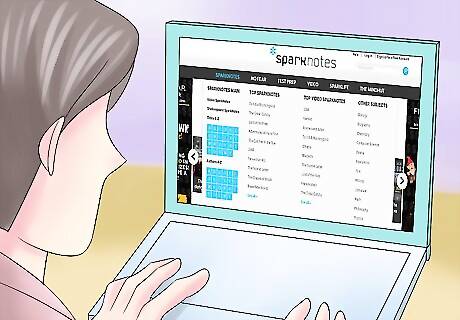
views
Study smarter.

Ace tests easily. Getting A's on tests is much easier than you think. One simple way to do this is to create study guides. Create an extensive, very simple study guide. Research definitions/solutions, even if you already know what the word means. Many of these websites give clear, simple definitions that are designed so that ordinary people can understand them. Get a clear, correct and simple definition for everything you will need to know. Then, go back into the textbook or review your notes. It will be much easier to understand them now that you actually know what everything means. Then you can continue work on your study guide. Add on to your simple definitions until they are up to the level of your class. Just writing them down will help you remember them, and you can look back at them later. A 3 page study guide can help a lot and can be done in under an hour. If you share them with your friends, they might share their next study guide with you. Working as a team like this can really help you out. If you're an auditory learner, you might study in a quiet space where you can re-listen to recorded lessons. If you're a visual learner, you could study in a room filled with color, creativity, and brightness. If you're a kinesthetic learner, you could study while standing up and writing on a whiteboard.
Study ahead of schedule.

Put in extra time. If you have some free time and you are bored, read the next chapter in your textbook. Do some problems and by the time your class catches up with you, everything in that chapter will be easy. If you don't have a textbook for a class, be curious. Look up definitions online, and look for lessons that you think will be coming up.
Use online resources.

SparkNotes usually isn't as good as reading a book, but it can help a lot if you have already read the chapter and then read the summary on SparkNotes. They will summarize it and emphasise the most important details. If you have read the chapter, everything SparkNotes says will increase your knowledge of the chapter. SparkNotes usually lists imagery and themes, and you can impress your teacher if you "find" another meaning to a chapter.
Finish homework early.

Do your homework efficiently. A lot of homework can actually be done in school: on the bus, during a long speech, or while you are waiting for class to start. Do as much as you can in school so that you have time at home to get ahead or just hang out. You can't get ahead if you're stressed out all the time, so try to leave room for just doing nothing.
Use a mind map when studying.

Take 10 minutes to draw a mind map of each chapter you have finished. One of the best way to master a subject is to have a global and synthetic vision about it. A mind map will also be a quick and invaluable resource to revise before exams.
Motivate yourself.

Wanting to learn or being excited about a subject can be very hard, especially with math. But lots of books and movies can make you more interested in all sorts of subjects. For example, the movie Live Free or Die Hard featured a computer hacker who shut down the entire world. This might get you slightly more interested in your computer courses. The book Bringing Down the House is about 6 MIT students who use their math knowledge to count cards and win enormous amounts of money at Casinos. This book could get you more interested in math. It sounds strange but movies and books can interest you in even the most boring classes. Build some momentum by starting with material that you understand well. Then, slowly work your way into the material that you don't understand as well.
Learn the system.

Like all organizations, school works through set processes and systems. To do well in school you need to familiarize yourself with the systems in use in your school. To put it simply you need to find out exactly what it is that your teachers expect of you and then do it. It doesn't matter whether you are writing absolute nonsense as long as it is what the teacher wants to hear. The teacher will drop hints throughout lessons about what they expect of you but there are some simple things that you can do to help push your grades higher; always spell check and punctuate your work correctly, use a thesaurus to replace commonly used words with more sophisticated terms (this can backfire however, you need to make sure that the word you are using fits the context in which you are using it perfectly or else you will look foolish). Use color and humor in presentations, work that looks as though it has had some effort put into it will usually get teachers salivating. You can also ask your teachers for extra help, most of them will jump at the chance to help someone who looks as though they want to learn. And last but not least, always go above the call of duty, find out what the teacher wants and then do more. Without fail you will achieve good grades. It's all about working the system.
Take extra classes.

If you want to get ahead, a good thing to do is to take extra classes to get prerequisites out of the way, or to just get more electives in before you graduate. Most schools only have 5 or 6 classes in a day although some schools have as many as 7 or 8, if you're in a school that offers more classes than the number of credits you need for graduation, take advantage of it instead of just taking study hall. Another way is summer school; if you are planning on taking a class in another district make sure you talk to your councillor to make sure your district will accept the credit. While summer school is great for those in districts which allow anyone to take summer courses, some districts only allow credit recovery students to take summer school courses. If your district will not allow you to take summer school courses or you have too much planned in the summer, try online courses; these are often costly although they will get you the credit you need/want. When looking for online high school courses make sure you check the accreditation, if they aren't accredited the class doesn't mean anything and you won't get credit for it. Always check with your councillor before signing up for extra classes.

















Comments
0 comment